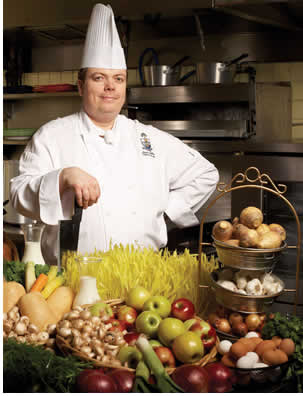So, not all experiments work out. For a local foods theme night at 89 Chestnut Residence cafeteria, Chef Jaco Lokker tried to feature Ontario beef or canned tomatoes in every course. Alas, his attempt at tomato basil ice cream for dessert didn’t make the menu. “You really need fresh tomatoes for that,” he admits.
That the good chef even tried to make ice cream from scratch – and such an exotic one at that – says much about the delicious developments at U of T since it has committed to buying some local foods. On this chilly January evening, Lokker’s dining room is a tasty slice of Tuscany – or is that Ontario? – with students indulging in rich tomato bisque, pasta and homemade pizza, all using canned tomatoes from Kerr Farms in nearby Chatham. For the meat eaters, there are hearty beef burgers and a succulent braised pot roast – and a farmer on hand to explain that the beef was raised humanely on small farms and without growth hormones or antibiotics.
Previous theme nights have featured organic dairy and Ontario apples – the apple flambé over ice cream was a huge hit. And Lokker, a towering man resplendent in chef’s whites, practically gets giddy about the summer, when he can buy local fresh produce to can and make vinaigrettes and sauces for the upcoming school year.
For Lokker, serving local food has become a passion, if not a mission. In September 2006, the University of Toronto partnered with Local Food Plus (LFP), a network of certified Ontario-based farmers and processors who grow and sell food produced according to sustainable methods that are good for the environment and give farmers a fair wage. According to Lokker, the methods, certified by independent inspectors, also result in tastier, more nutritious food. “You start with great ingredients that are healthier for the students,” says Lokker, who points out that LFP farmers growing produce minimize the use of synthetic pesticides. “We know the farmers have done their part in producing food in a way that’s safe and humane and contributes to the environment. These are responsible farmers and we’re doing the responsible thing by supporting them.”
But U of T’s first year of partnership with local farms was a struggle. With too few LFP farmers providing too little produce, students were hard pressed to see a difference in campus cafeterias. With U of T’s commitment, along with several Toronto restaurants and a few retailers, some 40 to 50 farmers have joined LFP and the program can now offer a greater variety of fresh produce, dairy and meats. Lokker estimates that about 15 to 20 per cent of the food in his kitchen is LFP-certified and he hopes to push that to 40 per cent in the coming years.
Recently, the chef also became director of food services for the St. George campus. The role involves championing improvements at the cafeterias, and Lokker’s major project has been promoting LFP and healthy eating options. “It’s taken off like wild fire,” he says. Now 10 of 12 cafeterias are serving LFP foods in some format – whether in a fresh-fruit fridge or salad bar or at catered events.
Students are a finicky lot when it comes to food, but at tonight’s theme night, there aren’t the usual complaints. As students navigate trays between build-your-own salad, pasta and stirfry stations, they take note of displays about the local foods being served. Some stop to chat to Stefan Oellinger of Kerr Farms. He answers questions about farming, shows pictures on his laptop of ripe tomato fields and cattle grazing on lush pasture land. His last stop was Morrison Hall at University College. “Students are really interested in agriculture,” he says. “This is an opportunity to talk to a farmer right in the city.”
While students are concerned with reducing their carbon footprint and supporting local farmers, they care about the taste and quality of the food first, according to Chris Melnick-MacDonald, a third-year student and residence-council representative. “Students are talking about this. The quality is exceptional. The food is really clean tasting and flavourful.”
Lokker stands by the information table, beaming. “This is the best job I’ve had in my life,” he says. “I’m working in an environment where people want to do the responsible thing. I’m working with youth. They’re at a point when they get to decide what they’ll eat, how they will live their life. If we can influence them to eat well, to eat responsibly, we’re able to touch students for the rest of their lives.”
Margaret Webb (BA 1985 UC) is the author of Apples to Oysters: A Food Lover’s Tour of Canadian Farms (Penguin) to be released on April 12.






